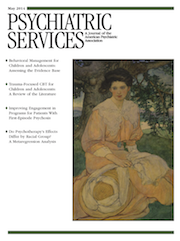A Multisite Study of the Prevalence of Serious Mental Illness, PTSD, and Substance Use Disorders of Women in Jail
Abstract
Objectives
This multisite study aimed to answer the following research questions about women in urban and rural jails. First, what is the current and lifetime prevalence of serious mental illness (major depressive disorder, bipolar disorder, and psychotic spectrum disorders) of women in jail? Second, what level of impairment is associated with their serious mental illness? Third, what is the proportion of incarcerated women with serious mental illness who also have posttraumatic stress disorder (PTSD), a substance use disorder, or both?
Methods
Participants were 491 women randomly sampled in jails in Colorado, Idaho, South Carolina, and the metropolitan area of Washington, D.C. Structured interviews assessed lifetime and 12-month prevalence of disorders and level of impairment.
Results
Forty-three percent of participants met lifetime criteria for a serious mental illness, and 32% met 12-month criteria; among the latter, 45% endorsed severe functional impairment. Fifty-three percent met criteria for ever having PTSD. Almost one in three (29%) met criteria for a serious mental illness and PTSD, 38% for a serious mental illness and a co-occurring substance use disorder, and about one in four (26%) for all three in their lifetime.
Conclusions
The prevalence of serious mental illness and its co-occurrence with substance use disorders and PTSD in this multisite sample suggest the critical need for comprehensive assessment of mental health at the point of women’s entry into the criminal justice system and the necessity for more programs that offer alternatives to incarceration and that can address the complexity of female offenders’ treatment needs.



